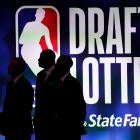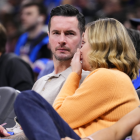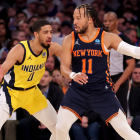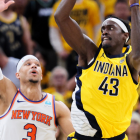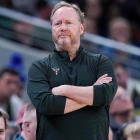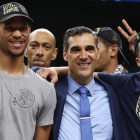On Nov. 26, 2013, the Los Angeles Lakers extended franchise icon Kobe Bryant on a two-year, $48.5 million deal that resulted in the final stretch of his NBA career, ending last April in that glorious 60-point, 50-shot win over the Jazz.
The contract -- $24.25 million per year -- is a deal structure that in modern NBA terms is still high, even after the gigantic cap leap last summer. It's $7 million more per season than Evan Turner landed in a deal that was widely thought to be an overpay.
That contract had a lot of wide-ranging impacts. It secured Bryant's legacy with the Lakers, ensuring he would play with one team for his entire career, and the financial benefits reaped from Bryant's immense popularity. It locked up a significant amount of cap space the Lakers had to work around, but in the end, they always had room for a max player if they could land one. (They could not.) It reinforced that Bryant was the leader, the face of the franchise, the No. 1 option, the centerpiece of any conversation that began with the Lakers. It showed the Lakers were willing to reward the greatest player in franchise history (apologies to Magic) for his contributions even if it meant not contending.
The Lakers were widely mocked for the decision. Bryant's extension covered the absolute pit of the Lakers' illustrious history, regardless of where you feel his play fit into those results.
Pat Riley had no intention of allowing any of the above for the Miami Heat when it came to Dwyane Wade, and that philosophy resulted in a bitter, ugly divorce which manifests itself on Thursday night as Wade's Chicago Bulls travel to Miami to take on the Heat.
The Bulls arrive in South Beach at 4-4, after a hot start that has tapered off, now playing inconsistent basketball night to night. One game they look like world beaters, the next they look disjointed and badly wired. Miami is a disappointing 2-4, but its losses were to teams playing great basketball -- San Antonio, Charlotte, Toronto, and Oklahoma City.
Maybe more important, the Heat are kind of strung together. It's Hassan Whiteside, Goran Dragic and Justise Winslow, who is shooting a pitiful 31 percent from the field and averaging just 11.8 points, along with a cast of role players who would be deep bench guys on other squads.
Dwyane Wade would make them a lot better.
Riley's decision to part with Wade over money this summer was a cold-hearted business decision that follows in the vein of Riley's core tenet that the organization always comes first. Wade himself said as much when discussing the fact he hasn't even spoken with Riley yet this week. From ESPN:
"I know who Pat is," Wade said. "It's no secret to me. I was there 13 years, I've seen a lot of players come and go. I know how he is. If you're not with him, you're against him. That's just the way he is. You got to understand that, man. And I'm cool with it. I'm fine, 100 percent. I was there 13 years so I've seen a lot of video tributes, seen a lot of players come in and go out. And I've seen the way he's responded to them. And I know if you're not with him, you're against him."
Source: Chicago Bulls guard Dwyane Wade hasn't spoken to Heat president Pat Riley in months.
There is a reason The Godfather films are so often referred to when it comes to Riley. You're either in the family, or you're dead to him. And the team always comes first. This has been a popular belief among some of the most powerful and successful organizations in sports. The Patriots embody this mindset. And truth be told, that's what made Bryant's contract so crazy since the Lakers had always been that way as well. There was a long, relatively acrimonious split between the Lakers and Jerry West when he was ousted from the team. Kareem Abdul-Jabbar? Still not welcomed back with open arms. But the Lakers operated in that manner in part based on wanting to appear to future free agents as a place that values loyalty.
Here's where it gets interesting. The Lakers have completely struck out in the past two free-agency periods, and there was a report (that was widely rebuked by players) that Bryant's presence was a hindrance in convincing free agents to join. Kevin Durant didn't even give them the courtesy of a meeting last summer, and Durant adores Bryant. Meanwhile ... the Heat have struck out as well. They didn't land LaMarcus Aldridge. They didn't land Kevin Durant. They struck out, and hard.
So the lesson there might be simple: If you can't prove you can compete, you're not going to land free agents. But one thing has gotten lost in the examination of Riley's plans.
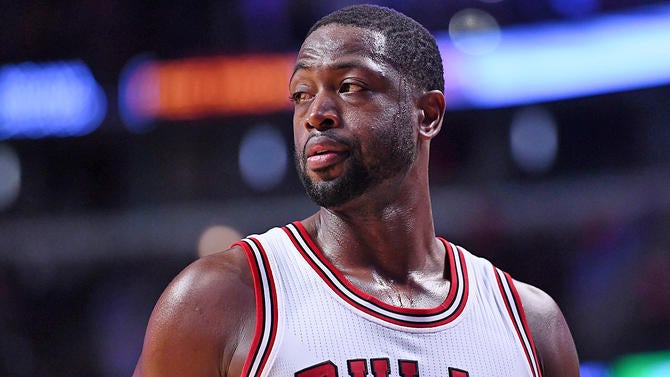
The Heat have never put together the pieces for a championship team without D-Wade as a selling point. Shaquille O'Neal knew he would have Wade to play next to, a star on the rise in 2004. And obviously, Wade was pivotal in the construction of the Triad in 2010 with LeBron James and Chris Bosh, both of whom now have deep grudges with the organization as well.
That last part matters, here. The Lakers were a mess for two years, and are only now starting to dig out of it. But when D'Angelo Russell, Jordan Clarkson and Julius Randle start to reach their prime, players will suddenly be interested in joining them as free agents again. Trade targets will look at that L.A. market again. And those players will know, after the Kobe signing in all its ill-advised glory, that the team values loyalty.
Now, on the flip side, let's say Winslow rebounds in a big way from his early slump and looks like a true star by the end of the year. He's not going to look like Wade, but alongside Whiteside and Dragic, there's at least something there. Free agents are going to know that things have ended badly there. That doesn't stop them from getting a big name because the players understand it's a business and the contract is the contract.
But what about the very top superstars? They want everything perfect, and that's where organizational values matter. The Heat have prided themselves on a close-knit, "professional family" (even if that sounds contradictory) approach, but they've shown that once you're on the outside, that's it. You're out. That's not to say this will always happen, but it's a factor.
And in the short term, the Heat could still use Wade. His money was restrictive for their future, but the cap continues to go up, there's a likelihood Chris Bosh's deal will come off the books at season's end (in a whole other story for another time), and they'll still have trade options to create the space they would need. If a star point guard is interested, you're not going to keep Goran Dragic if that free agent is an upgrade. If they have a chance to get DeMarcus Cousins, Hassan Whiteside might be the cost of doing business.
Wade, meanwhile, has helped Chicago. Not only is he knocking down 3-pointers for the first time in his career (43 percent) and rebounding at a strong per-possession rate, he's provided leadership and helped lighten a once-toxic Bulls locker room.
It's not all roses and balloons. According to NBA.com, the Bulls have been 11.5 net points per 100 possessions worse than their opponent with Wade on the floor. In simple terms: Chicago has been better with him on the bench, and it's the biggest disparity on the Bulls' roster.
That's a continuation of what we saw with the Heat last year. Wade's individual numbers were good, but the team performed worse with him on the floor. This is a legitimately concerning trend, that's masked by Wade's surprising shooting numbers and the Bulls' better-than-expected start.
Add all this together and you have a confusing and awkward situation as the Bulls face the Heat. The Bulls are worse with Wade on the floor, but better with him on the team. The Heat weren't better with Wade on the floor, but their roster and future are worse without him. Heat fans still miss Wade and will give him the ovation he deserves.
The free agency decisions of the past six years have wrought a great deal of hand-wringing over the morality of a player leaving one team for another. But if you want to know the other side of that coin, the side that players turn to as proof that they must prioritize their careers, look no further than the sight of Dwyane Wade, happy in a uniform he never wanted to wear, taking on the team that might never be able to replace him.














